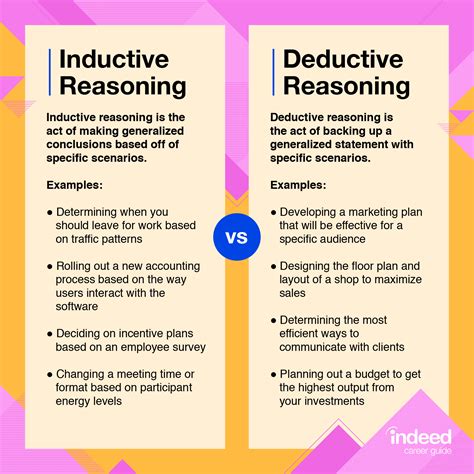Understanding Inductive Reasoning: Definition And Examples

Inductive reasoning is an important skill that helps us to make logical conclusions based on specific observations. It is a process that involves making generalizations based on individual instances or examples. In this article, we will explore the definition of inductive reasoning, provide examples, and discuss its importance in various fields.
What is Inductive Reasoning?
Inductive reasoning is a type of logical thinking that involves using specific observations or facts to develop a general conclusion or theory. This process involves taking a particular example or observation and making a broader conclusion based on it. It is commonly used in scientific research, data analysis, and problem-solving.
How Does Inductive Reasoning Work?
Inductive reasoning works by observing specific instances or examples and then drawing a conclusion based on those observations. This type of reasoning does not provide certainty, but rather a degree of probability that the conclusion is accurate. The more examples that support the conclusion, the higher the probability of its accuracy.
What are the Steps in Inductive Reasoning?
The steps in inductive reasoning are as follows:
- Observe a specific example or instance.
- Identify patterns or trends in the observation.
- Develop a hypothesis or general conclusion based on the patterns or trends.
- Test the hypothesis using additional observations or experiments.
- Revise the hypothesis based on the results of testing.
- Repeat the testing and revising process until a reliable conclusion is reached.
Examples of Inductive Reasoning
Here are some examples of inductive reasoning:
Example 1:
Observation: Every time I eat peanuts, my throat swells up and I have difficulty breathing.
Inductive Reasoning: Peanuts cause an allergic reaction in my body.
Example 2:
Observation: Every time I fill up my car with gas, the price is higher than the last time I filled up.
Inductive Reasoning: Gas prices are increasing over time.
Example 3:
Observation: Every time I drop a ball, it falls to the ground.
Inductive Reasoning: Gravity causes objects to fall to the ground.
The Importance of Inductive Reasoning
Inductive reasoning is an important tool for making informed decisions based on observation and evidence. It is used in a variety of fields, including:
- Science
- Mathematics
- Business
- Law
- Medicine
- Engineering
Inductive reasoning allows us to make predictions based on patterns and trends, and can lead to new discoveries and innovations. It is also useful in problem-solving, as it allows us to identify potential solutions based on past successes or failures.
FAQs
What is the difference between inductive and deductive reasoning?
Inductive reasoning involves making generalizations based on specific observations or examples, while deductive reasoning involves starting with a general theory or hypothesis and testing it using specific observations or evidence.
Is inductive reasoning always accurate?
No, inductive reasoning does not provide certainty, but rather a degree of probability that the conclusion is accurate. The more examples that support the conclusion, the higher the probability of its accuracy.
What are some common errors in inductive reasoning?
Some common errors in inductive reasoning include:
- Jumping to conclusions without sufficient evidence
- Ignoring evidence that contradicts the conclusion
- Mistaking correlation for causation
- Not considering alternative explanations
Conclusion
Inductive reasoning is a valuable tool for making informed decisions based on observation and evidence. By observing specific instances or examples and developing general conclusions based on those observations, we can make predictions, identify patterns and trends, and make informed decisions in a variety of fields. However, it is important to be aware of potential errors in inductive reasoning and to test and revise hypotheses based on additional evidence and observations.
